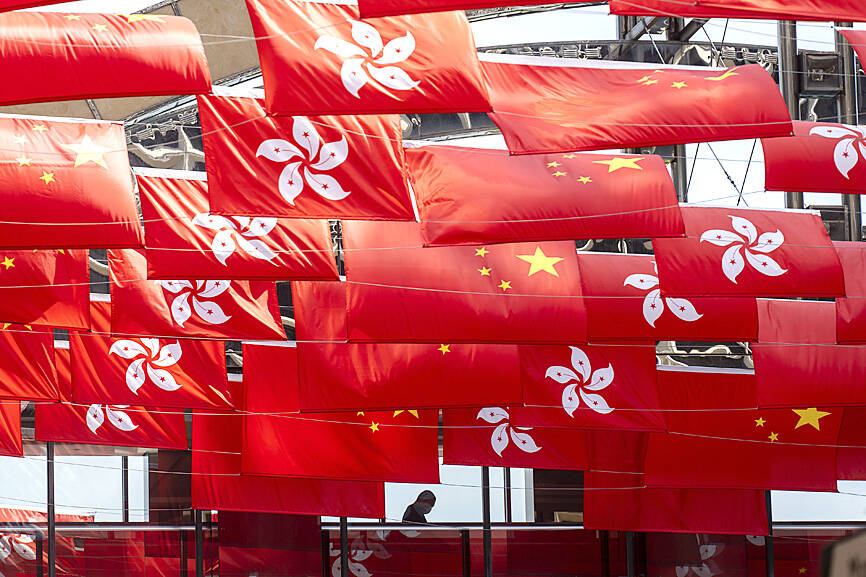The Mainland Affairs Council (MAC) has released new guidelines advising government employees visiting Hong Kong and Macau not to take part in any activity that could be construed as contravening the Chinese territories’ new national security law.
Officials from the Executive Yuan and its affiliated organizations or agencies should also refrain from making comments deemed illegal by the territories’ governments and not visit “banned areas,” the council said.
The council recently amended the Regulations for Executive Yuan and Affiliated Organizations and Agencies on Visiting Hong Kong or Macau (行政院及所屬各機關(構)人員赴香港或澳門注意事項) following the Hong Kong government’s passage in March of the Safeguarding National Security Ordinance, commonly known as Article 23.

Photo: AP
According to an unnamed source, the Executive Yuan has notified ministries and agencies that the amendment takes effect immediately.
The amendment urges government officials traveling to Hong Kong or Macau to attend events or meetings to plan their trips carefully, avoid discussing sensitive matters, and assess and form contingency plans regarding possible risks.
Government officials can solicit the opinions of the council if necessary, the statement said.
Officials should observe standing regulations and refrain from taking official files unrelated to the events or meetings they would attend in Hong Kong or Macau, and ensure that any cellphones or laptops they carry contain only information about those events or meetings, the statement said.
Officials traveling to Hong Kong or Macau should, in principle, take planes or ships operated by Taiwanese companies whether on official business or not, the amendment states.
During their stay in Hong Kong or Macau, government officials should refrain from speaking or acting in ways which the local governments would consider illegal.
Additionally, they should not stray close to “banned areas” as defined by the national security laws.
Article 23 states that any acts of espionage, defined as infiltrating, coming near to or investigating “banned areas,” either in person or via uncrewed vehicles, or attempts to intercept communications to obtain directly or indirectly helpful information benefiting foreign forces, could be punishable by imprisonment for 20 years.
Banned areas are defined as military or national defense-related areas within the Hong Kong and Macau regions, areas that the Garrison Law designate as off-limits military areas, or locations and transportation facilities that the local governments occupy for military or national defense purposes.
Officials are also advised to be cautious, travel in groups and not visit areas with known protests or processions or enter questionable facilities alone, the council said.
If officials experience any attempts by the Chinese authorities to detain, arrest, restrict their freedom of movement, search or interrogate them, they should contact the MAC Hong Kong or Macau office for assistance, the council said.

LONG FLIGHT: The jets would be flown by US pilots, with Taiwanese copilots in the two-seat F-16D variant to help familiarize them with the aircraft, the source said The US is expected to fly 10 Lockheed Martin F-16C/D Block 70/72 jets to Taiwan over the coming months to fulfill a long-awaited order of 66 aircraft, a defense official said yesterday. Word that the first batch of the jets would be delivered soon was welcome news to Taiwan, which has become concerned about delays in the delivery of US arms amid rising military tensions with China. Speaking on condition of anonymity, the official said the initial tranche of the nation’s F-16s are rolling off assembly lines in the US and would be flown under their own power to Taiwan by way

CHIP WAR: The new restrictions are expected to cut off China’s access to Taiwan’s technologies, materials and equipment essential to building AI semiconductors Taiwan has blacklisted Huawei Technologies Co (華為) and Semiconductor Manufacturing International Corp (SMIC, 中芯), dealing another major blow to the two companies spearheading China’s efforts to develop cutting-edge artificial intelligence (AI) chip technologies. The Ministry of Economic Affairs’ International Trade Administration has included Huawei, SMIC and several of their subsidiaries in an update of its so-called strategic high-tech commodities entity list, the latest version on its Web site showed on Saturday. It did not publicly announce the change. Other entities on the list include organizations such as the Taliban and al-Qaeda, as well as companies in China, Iran and elsewhere. Local companies need

CRITICISM: It is generally accepted that the Straits Forum is a CCP ‘united front’ platform, and anyone attending should maintain Taiwan’s dignity, the council said The Mainland Affairs Council (MAC) yesterday said it deeply regrets that former president Ma Ying-jeou (馬英九) echoed the Chinese Communist Party’s (CCP) “one China” principle and “united front” tactics by telling the Straits Forum that Taiwanese yearn for both sides of the Taiwan Strait to move toward “peace” and “integration.” The 17th annual Straits Forum yesterday opened in Xiamen, China, and while the Chinese Nationalist Party’s (KMT) local government heads were absent for the first time in 17 years, Ma attended the forum as “former KMT chairperson” and met with Chinese People’s Political Consultative Conference Chairman Wang Huning (王滬寧). Wang

CROSS-STRAIT: The MAC said it barred the Chinese officials from attending an event, because they failed to provide guarantees that Taiwan would be treated with respect The Mainland Affairs Council (MAC) on Friday night defended its decision to bar Chinese officials and tourism representatives from attending a tourism event in Taipei next month, citing the unsafe conditions for Taiwanese in China. The Taipei International Summer Travel Expo, organized by the Taiwan Tourism Exchange Association, is to run from July 18 to 21. China’s Taiwan Affairs Office spokeswoman Zhu Fenglian (朱鳳蓮) on Friday said that representatives from China’s travel industry were excluded from the expo. The Democratic Progressive Party government is obstructing cross-strait tourism exchange in a vain attempt to ignore the mainstream support for peaceful development